Around here life is tough on our herons when temperatures turn frigid. Finding open water for fishing is almost impossible and nights are long and difficult to survive without much food in the belly.
For a week or so before Christmas this Great Blue Heron hung around one of the few spots that had open water at Farmington Bay. When I’d arrive in early morning, temperatures were always just above zero degrees F. and this bird was usually in the same area. It was approachable because of the cold.
Most of these shots were sidelit so this post is more about behavior than it is image quality. Sorry, but this morning I simply don’t have time to post techs.
This shot provides the viewer with a better appreciation of the conditions. Everything was covered with hoarfrost and there are frost flowers growing on the surface of the ice. The only open water was where it was flowing relatively fast out of frame to the right.
Soon the bird decided it was time to go fishing so it walked on the ice to the open water. This was fun to watch. The ice was as slick as it could be and the heron was obviously very concerned about falling so it walked ever so slowly and carefully as it approached the edge of the ice. With such long legs its center of gravity would be very high so it would easy for its legs to go out from under it. I likened it to one of us trying to walk on the ice using stilts.
I expected the bird to fish from the ice edge but it didn’t. The ice is extremely thin where it meets the water and I wondered if it might have fallen through some time earlier. It stood erect and looked out over the small patch of open water, apparently looking for a promising fishing spot a few feet in front of it. When it had made the decision…
it flew to the spot, perhaps 40′ away.
As it landed with those huge, intimidating wings spread out it scared the poop out of a coot, which is doing a belly-slide across the ice. At this point I left for opportunities elsewhere because the heron soon moved into the shade.
Six mornings later I found the same heron (most likely) in almost the same spot as before. It was even colder than before and if you look closely you’ll see a large and heavy mass of ice frozen to and hanging from its belly feathers. This happens when the bird is fishing in open water and the air is very cold. I’ve seen the same thing several times before.
A closer look at the “ice ball”. I suspect that this heron endured the ice ball all night and since the bird was facing into the (slightly) warming sun its orientation may have been a deliberate attempt to melt the ice (just a guess on my part). When it gets cold enough to freeze all of the water on the refuge these herons resort to hunting voles. If the snow is too deep for that they’re just out of luck.
Life can be tough for birds in northern Utah during winter.
Ron


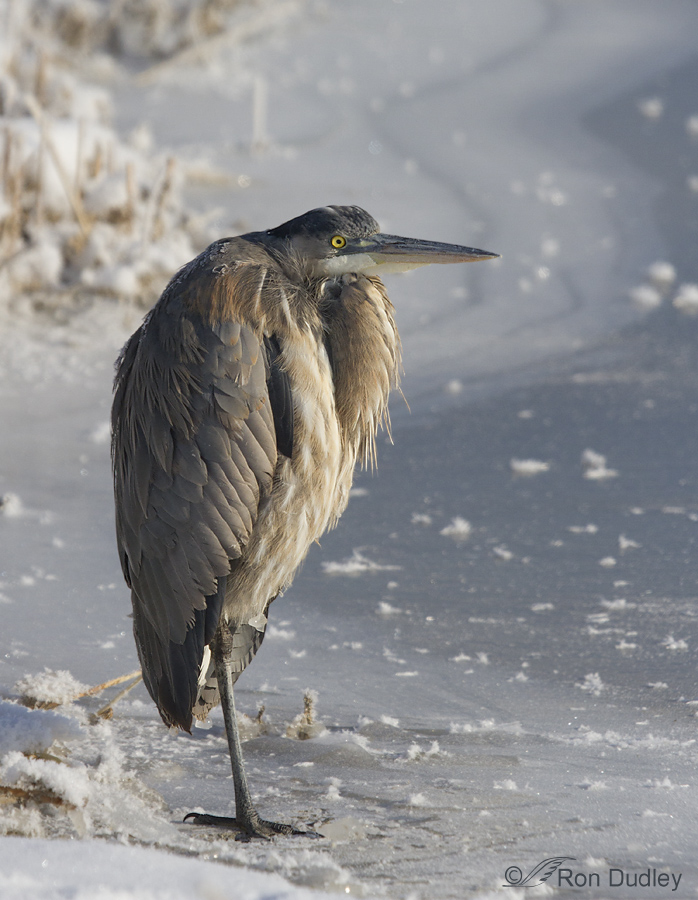
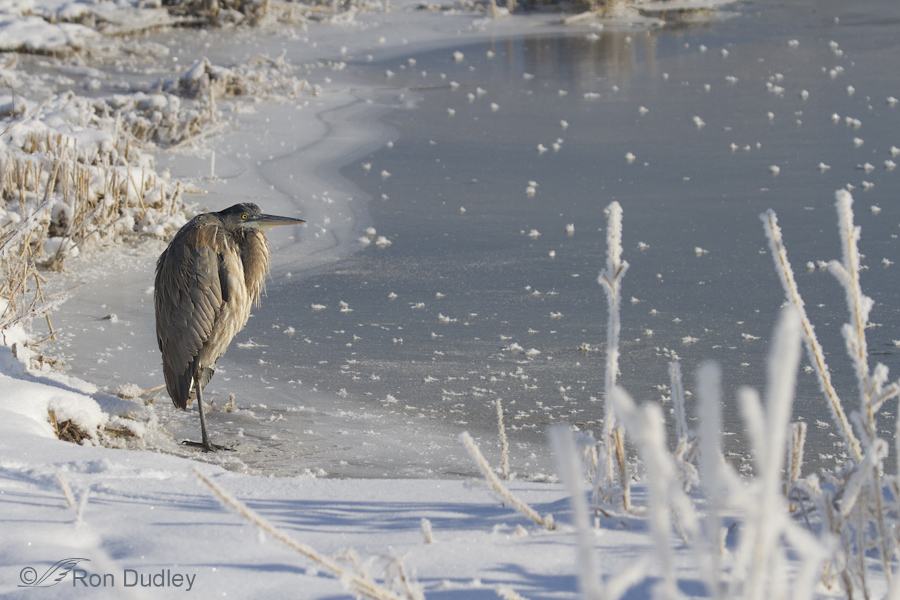
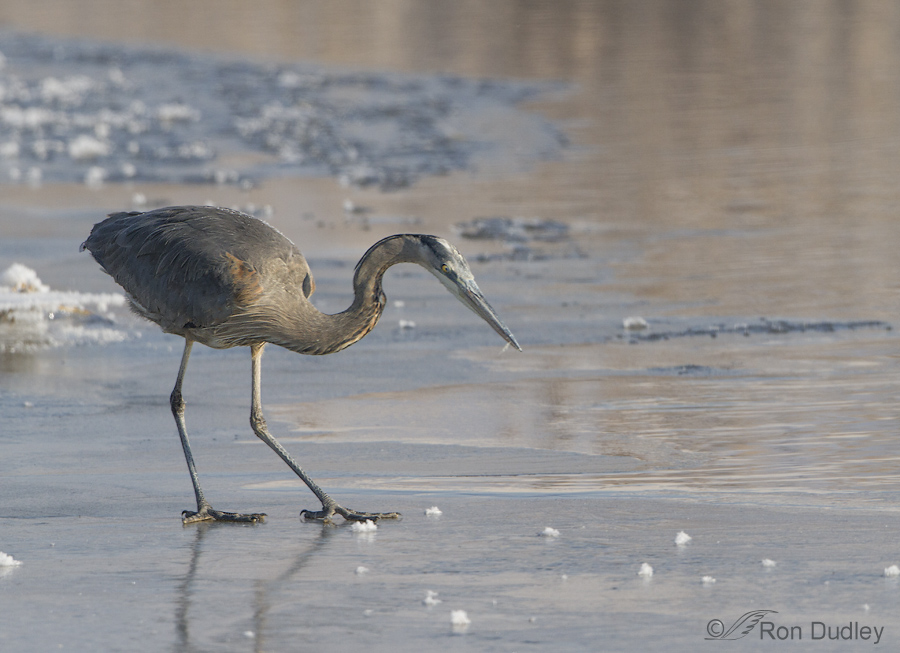
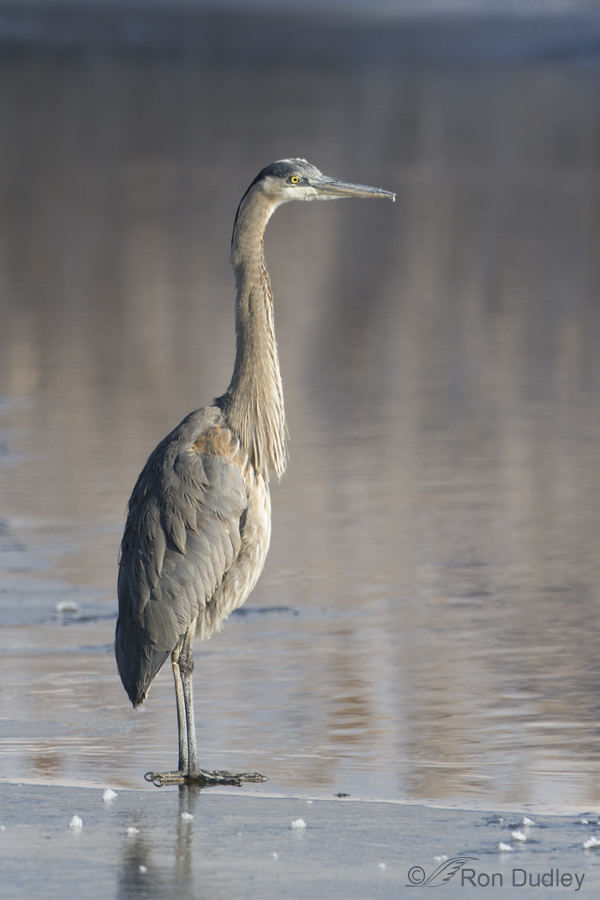
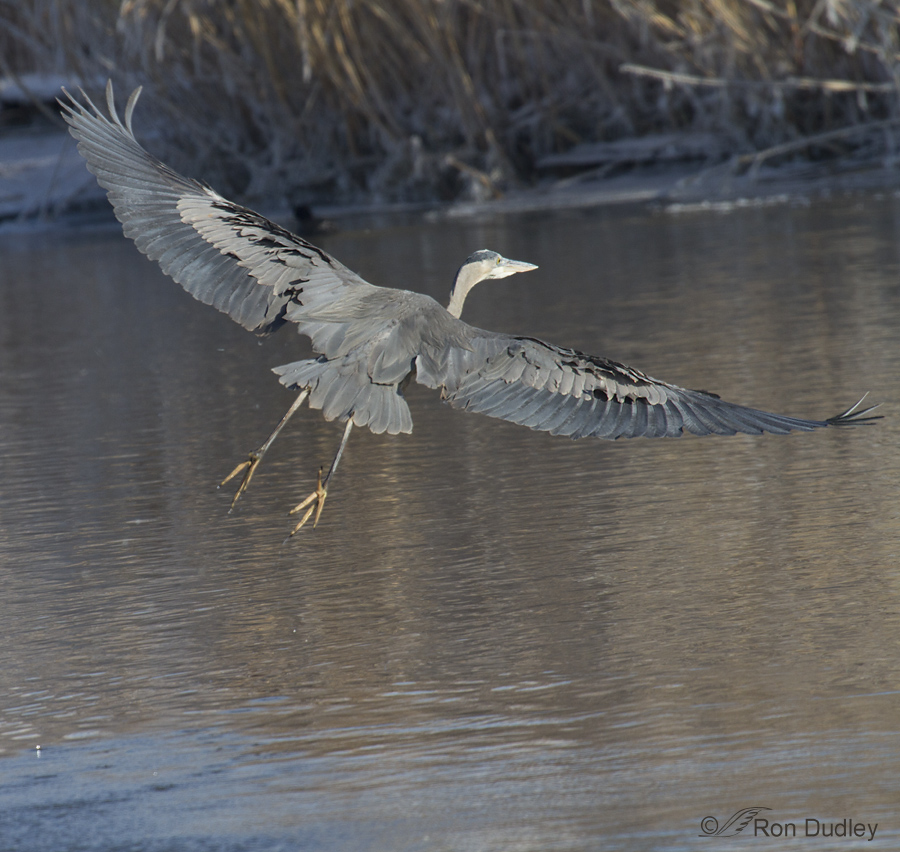
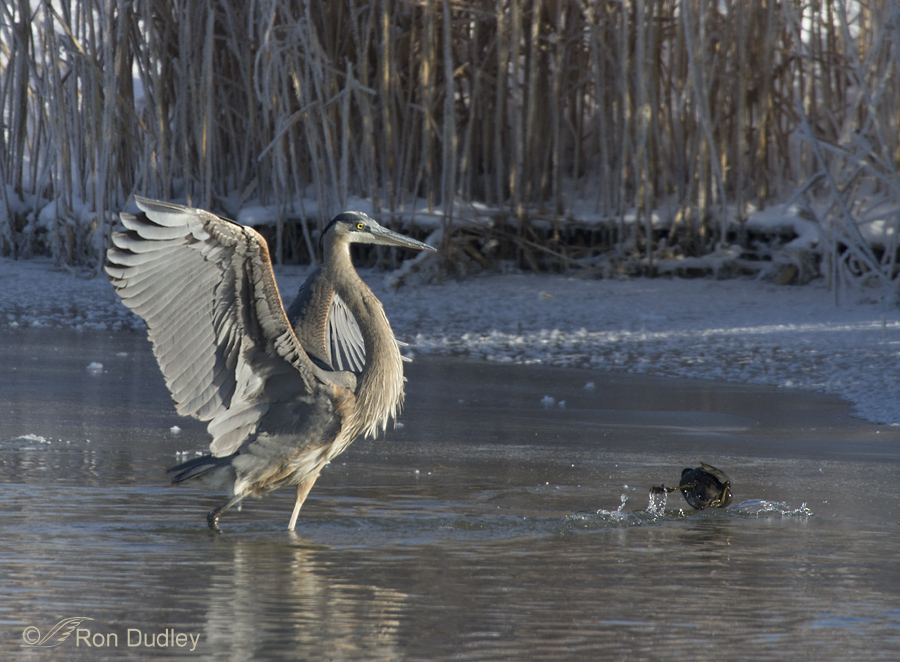
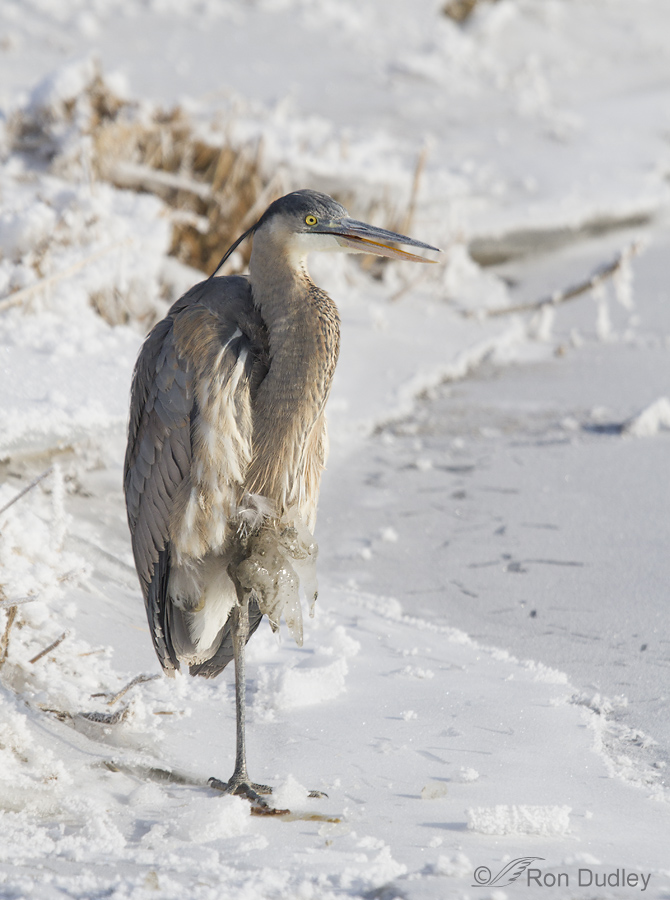
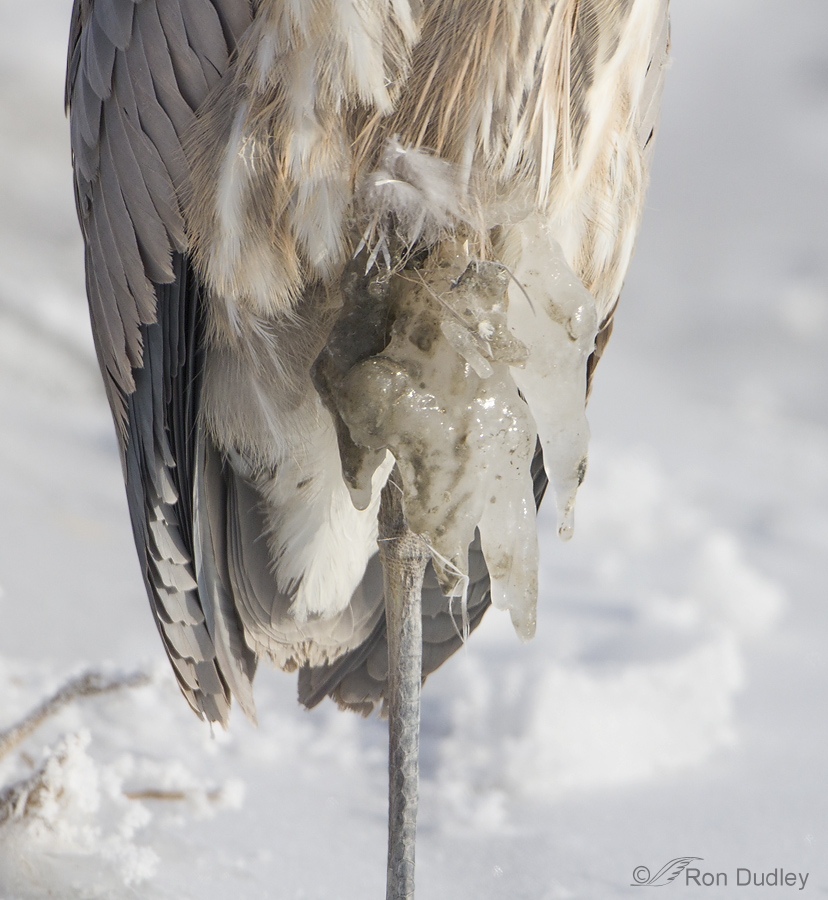
Poor bird! It amazes me to see what animals are able to survive – situations where we can’t if we don’t have our heaters and clothing, etc. I hope it survived okay.
It really looks cold – I must admit my heart goes out to it. I love the detail and light in number 6.
It’s a tough life your birds have in winter. Some beautiful images there though, despite the conditions.
These are beautiful shots of one of my favorite birds. Yes, winter is tough, and that ice lump on the poor bird looks almost lethal. I had no idea that they hunted voles! Thank you for the pics and info.
Tana, I was quite surprised several years ago when I first watched a couple of herons hunting voles. They were very good at it too – bloody bills and all. I have photos of them doing it somewhere but search as I might I just can’t seem to find them. A major breakdown in my filing system that hasn’t happened before…
Strictly artistically, images 2 and 6 can’t be beat…they’re exquisite! Would make wonderful paintings!
I’m glad you like those two images, Patty and I agree with your assessment. Thank you.
Ouch. Even cold loving me, winces at the ice ball.
Thanks Ron – for your dedication and the beauty/education you give us. I hope that conditions ease for the heron, and all the other birds. Soon.
Loved the belly scoot too.
Thanks, Elephant’s Child. Conditions have eased somewhat since these photos were taken several weeks ago. I was out there this morning and it was significantly warmer with more open water.
I love frame #6 but all frames are great in that they tell the whole story. I suppose these are the “vagrants”, aren’t they? Ron; I was finally able to record the mating act of the Green Iguana. Although I know you’re more into birds than reptiles, I’d thought you’d be interested. I also changed my blog URL to: http://thetropicalfloweringzone.com
The last post is one about them finishing the coupling. But the main post is titled: The Mating Act of the Green Iguana, seen here: http://thetropicalfloweringzone.com/2014/01/01/finally-the-green-iguana-mating-act/ which is the one you might be interested in looking at.
What’s fascinating is how reptiles remained terrestrial and are so dependent on flora and their cold blooded metabolism makes them so unique to the tropics. When I see this beautiful Great Blue Heron I wonder if this the “vagrancy” phenomena.
Maria, some of our Great Blues hang around all winter but many of them clear out if it gets very cold. Thank you.
A fascinating, sad reminder of how difficult it can be for so much of wildlife in extreme winter conditions. I sure hope that icy “ball and chain” was dropped in the morning sun…a heavy burden to carry for even a well-fed bird…a real energy zapper…
I agree, Patty – that ice load would be difficult to fly with.
Awww Ron … bless his little heart … close your eyes and don’t read what I’m about to type, but if it were me, I’d probably be visiting the local market and hauling buckets of fishies out to the poor thing every morning! GREAT images!!! And I loved reading all about your little friend. They look like such tropical birds, hard to believe you have them where you are!!! We have a few … I guess I thought they migrated in winter … learn something new every day!!!
There’s usually plenty of fish in that pond, Lois so the heron should do ok unless it freezes over entirely.